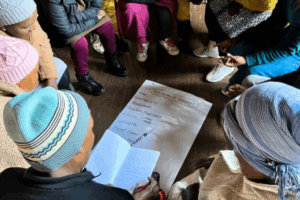The restriction of travel and movement that has characterised early responses to the global pandemic directs our attention to the ability of the trade union movement in Africa to organise and bargain when traditional face to face interactions are not feasible. The Emergency Online Solutions to the Covid-19 Pandemic for African Trade Unions report presents the views of the secretaries of five Africa Global Union Federations (GUFS) interviewed by Saliem Patel, Program Manager at IFWEA.
Interview participants
- Paule Ndessomin, sub-Saharan Africa Regional Secretary, IndustriALL
- Mohammed Dauda Safiyanu, Africa Regional Secretary of the International Transport Workers’ Federation (ITF)
- Crecentia Mofokeng, Africa and Middle East Regional Secretary, Building and Wood Workers’ International (BWI)
- Mavis Koogotsitse, General Secretary, Southern Africa Trade Union Coordinating Committee (SATUCC)
- Keith Jacobs, Africa Regional Secretary, UNI Global Union (UNI).
Key questions
- How are their Federations and African affiliates affected by Covid-19?
- How are they responding to the pandemic and how effective is their use of online tools and methods in this response?
- What support could make their use of online tools and methods more effective during this crisis period?
Summary of the key points of the report
- Worker leaders at the shop floor are hard to reach. Even national centres can be hard to communicate within the current context.
- There has been an uneven uptake of online communication tools by the movement in Africa.
- The cost of communicating is high for role players in many national settings in Africa, specifically the cost of mobile data.
- While there are several useful online communication platforms, WhatsApp appears to be the medium of choice, especially among worker leaders at the local level.
- The information needed for communication is not always in place: There is an opportunity to consolidate and systematise trade union contact information at different levels (regional, national and local). This would enable a range of communication strategies.
- The movement faces heightened financial pressures at all levels: The pandemic has forced many governments to provide financial relief to households and companies. Similarly, the pandemic requires that we provide the trade union movement in Africa with the necessary resources to meet the challenge.
- Existing networks and alliances provide the trade union movement with channels for building up communication strategies.
- Technology does not implement itself. The role of setting up, administering and facilitating each instance of online communications is important.
- There is an opportunity to popularise agreements that have already been struck in response to the health effects and the economic effects of the pandemic: An accessible online library of agreements can be used to build pressure employers to respond to the pandemic. These agreements provide a precedent for responding, create peer pressure on companies to respond and serve as reference points for defining the kind of responses we want to see in different settings.
- There is an opportunity to build the skills required to use information and communications for bargaining and organising: At a slightly more advanced level, there is an opportunity to build capacity to generate quality audio-visual content for bargaining and organising campaigns.
Utilise LRS Agreements Database (AGREED)
The Labour Research Service can contribute to popularising agreements that have already been struck in response to the health effects and the economic effects of the pandemic. We call upon trade unions to assist in gathering these agreements and we can upload them to an online library that makes them widely accessible. As an example: Start typing “SACTWU” in the UNION box. Select SACTWU when it appears and then click on FIND below the boxes. The database will give you a list. The 7th entry is a Covid-19 Lockdown Collective Agreement in the clothing manufacturing sector in South Africa. Click on it and you can access the agreement in PDF.







